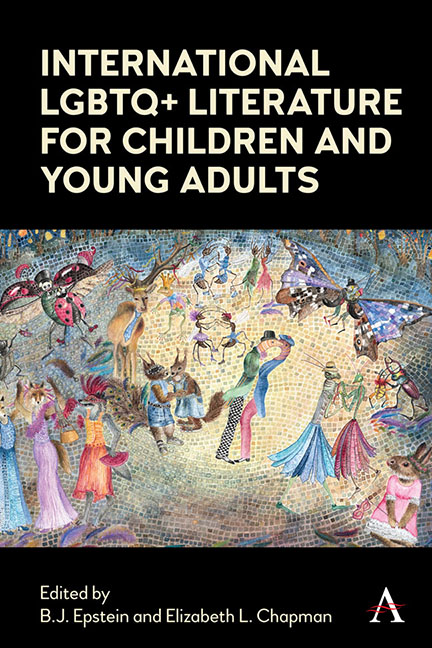Book contents
- Frontmatter
- Dedication
- Contents
- List of Illustrations
- Acknowledgements
- Notes on contributors
- Introduction
- BRAZIL
- FRANCE
- GERMANY/ AUSTRIA
- GREENLAND
- INDIA
- INDIGENOUS WRITING
- ITALY
- MULTINATIONAL
- MULTINATIONAL
- MULTINATIONAL
- THE PHILIPPINES
- SLOVENIA
- SOUTH KOREA
- SPAIN
- SWEDEN
- SWEDEN
- List of Primary Texts
- Index
Chapter Sixteen - Becoming Versus Being: Nature, Nurture and Stereotypes in Swedish LGB Young Adult Novels
Published online by Cambridge University Press: 18 November 2021
- Frontmatter
- Dedication
- Contents
- List of Illustrations
- Acknowledgements
- Notes on contributors
- Introduction
- BRAZIL
- FRANCE
- GERMANY/ AUSTRIA
- GREENLAND
- INDIA
- INDIGENOUS WRITING
- ITALY
- MULTINATIONAL
- MULTINATIONAL
- MULTINATIONAL
- THE PHILIPPINES
- SLOVENIA
- SOUTH KOREA
- SPAIN
- SWEDEN
- SWEDEN
- List of Primary Texts
- Index
Summary
Introduction
In this chapter, I explore Swedish-language LGB young adult (YA) novels, arguing that while liberal in their approaches to a certain extent, they also tend to implicitly raise the issue of nature versus nurture while focusing on the ‘causes’ of queerness; in other words, they suggest, through their plotlines and character depictions, that it is usually nurture that ‘turns’ someone queer. In addition, many texts rely on stereotyped ideas of queerness, some of which are related to the concept of who or what is to ‘blame’ for a character being LGBTQ+. It is important to acknowledge some limitations of this research at the outset. In this chapter, I do not discuss trans or, more generally, queer literature; for one thing, I do not have enough space here to do so, and for another, Asa Warnqvist's chapter in this book explores Swedish-language trans literature in particular. Also, I focus on young adult literature, rather than also analysing picturebooks and junior fiction (see Epstein 2013a for more on picturebooks and middle-grade literature). In large part, I focused the chapter in this way because YA books usually have young adults as their protagonists while picturebooks and junior fiction tend to have LGBTQ+ adults as the main queer characters, usually parents of the protagonists, and so the works were not exactly comparable, and also this kept the corpus size manageable for a short chapter. Finally, I only look at Swedish-language originals, rather than also analysing translations to Swedish; I do this in order to keep the focus firmly on the Swedish context. I discuss the corpus more below.
I also want to note that I take a queer theoretical approach to the concept of queerness. Some people claim that queerness is caused by nature (that is, it stems from genes and biology), while others say it is nurture (in other words, the environment, including family and culture, that someone was raised in); oddly, however, we do not often have this discussion regarding what causes someone to be heterosexual or cisgender, when it would arguably follow that all sexualities and gender identities would be shaped or constructed in the same way (see Sullivan 2011, 4–6).
- Type
- Chapter
- Information
- International LGBTQ+ Literature for Children and Young Adults , pp. 303 - 318Publisher: Anthem PressPrint publication year: 2021



